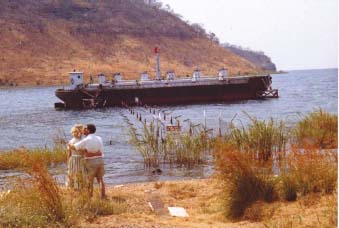Roses Under the Miombo Trees (16 page)
Read Roses Under the Miombo Trees Online
Authors: Amanda Parkyn
After the now usual goodbye parties in Gwelo, suddenly Mum was gone, flying back from Salisbury to Britain and their new home, the old vicarage she and Pa were restoring on the Herts/Cambs border. She took with her a copy of the Rhodesia Herald (âestablished 1891') for 23 April 1963, filed it away with my letters. Its yellowed broadsheet pages bring me a feel of that Salisbury, of those times, like a scent captured in a bottle. It was St George's Day, 50th anniversary of the laying of the Cathedral's foundation stone. The Southern Rhodesia government was declaring war on juvenile delinquents; the city was âshivering through one of its coldest April days ever' (62.4 F at midday). In London, the United Nations Subcommittee on Colonialism had been told âpolitely but firmly that the British government cannot permit any interference in the domestic affairs of Southern Rhodesia'. On an inside page, the editor had seized gleefully on a piece from the Yorkshire Post, thundering that âan Eskimo would be as well qualified to advise on how to fight bush fires as the U.N. Sub-Committee on Colonialism is to advise Britain on political affairs'. The new Prime Minister, Mr Winston Field [shortly to be succeeded by Ian Smith] had written to Mr Rab Butler, First Secretary of State, repeating that Southern Rhodesia âmust be given independence on the day that either Northern Rhodesia or Nyasaland secedes or gains independence'. Beside an advertisement for French velvets at 29s 6d a yard, the U.S. 7th Fleet was reported to be sailing into the Gulf of Siam amidst concern over developments in Laos, while President Kennedy was meeting with his National Security Council. Further on, amidst advertisements for Windolene and Brisk soap, an African had been sentenced to death for murder in Ndola, tourist numbers were down 5% âdue to news reports'. Joshua Nkomo (who had recently testified to the UN Sub-Committee on Colonialism, urging them to intervene in Southern Rhodesia) was expected to appeal against his conviction and sentence to six months hard labour for âassaulting, resisting or obstructing police officers'. Meanwhile in Lusaka, Mr Martin Kaunda, a well-known teacher, had been accepted as âthe first African south of Uganda to join the Rotary Club'. Helen Shapiro, âBritain's raven-haired 16-year old singing sensation' would soon be appearing at the Palace. On the tobacco auction floor, sales for the previous day were 2,068,535 lbs, at an average price per pound of 37.16 pence. Trading in copper from Northern Rhodesia's mines was slow.
Both Paul and I felt doleful at Mum's departure, Paul was whiney and clingy at the loss of so much loving and undivided attention, I with a sudden sense that little stood now between us and our transfer to the back of beyond. Was Mark anxious too at this big career leap, and a posting so far from branch office support? I think we would have both been too busy making the best of it to bring our anxieties into the open. My own were eased a little by a visit from Paul Scotcher who, after a couple of years as the Abercorn rep, would soon be handing over to Mark. They spent some time talking work over their beers, and when I joined them he described life there: a great place, he said, good social club, sailing, families with young kids â you'll soon make friends. But, he added, shopping is a bit of a problem, you have to order a lot â and take every stick of furniture you need. This meant shopping, which was anathema to us for the strains it put on our budget.
By late May I suspected I was pregnant, thrilled to have it confirmed before we left Gwelo. I had explained to Mark my longing to have children closer together in age than I was to my own three brothers. The oldest, Will, was 3½ years younger than me and I wanted my children to have a better chance of growing up in a closer relationship and enjoying each others' company. Now busy with endless decisions of what to take and what to throw, hauling out our battered suitcases for packing, I was not so thrilled at the inconvenient morning sickness that suddenly beset me. I was going to lose my support system too, those more experienced mums who had seen me through the first pregnancy and Paul's birth. We sadly did the rounds of farewell parties with couples who had become good friends, swearing to correspond, to keep up with each others' family news. Whilst I am sure we all meant it, at the same time I somehow sensed we were unlikely ever to see each other again.
Our little Mini was to take us as far as the Copper Belt, but with no room for Boy. We organised for Mark's colleague Doug to have him flown up once we arrived, while Twist the cat found a new home with the Arkwrights. Daniel meanwhile had decided to return to Nyasaland. It had never occurred to us to suggest he and Inez come with us, it was far too remote for that. As I had sorted and packed, a small heap of unwanted clothes had grown until they filled a big old cardboard suitcase. Now, with the house echoing and empty, cleaned for the last time by Daniel, we all stood at the back door, dressed in our travelling clothes, the back of the Mini piled high. We presented Daniel with the battered case, and Mark handed him his savings account pass book, into which we had deposited a small amount each month, with strict instructions to use it wisely. Daniel took it with cupped hands and a respectful âYes baas, thank you baas,' in his soft voice. I looked at Inez: was her waist filling out, or was I imagining it? I did not like to ask. They climbed into Mark's Zephyr for a lift to the station, while Paul and I waited for the Cummings to come and take the keys from us.
Daniel: A Postscript
A couple of weeks after we arrived in Northern Rhodesia, a letter arrived for Mark from the BSA (Southern Rhodesian) Police. It reported that a native, Daniel xxx, had been found to have in his possession a suitcase of clothes that clearly belonged to a European. The native claimed that these had been given to him. Would the addressee now please confirm if this claim was correct, so that the native could be released, otherwise the matter would have to be further investigated.
We were furious: honest Daniel, now held at the border on account of an old suitcase of cast-offs! Too late we realised that we should have foreseen this and issued a letter to him in the first place. Mark hastily wrote a stiff note confirming the gift and we just hoped that it would get there.
Â
Long Distance
All morning I've been reading my old letters home,
the crumpled aerogrammes and flimsy sheets
rustling from airmail envelopes.
Here in the margin, 15 December 1961,
I'd written our phone number â had added
âa party line I fear, so we'll ring you'.
Gwelo 362327: studying the digits, I'm seized
with longing to reach for the phone: to check
the country's codes, punch in the numbers,
wait for the connecting hums and clicks, to hear
the faint ring-ring ⦠ring-ring ⦠and then at last
my own young voice, bright with energy: âHello?'
Â
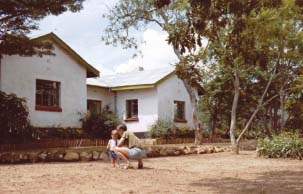
Our house in Abercorn: brother Will with Paul on the embryo lawn
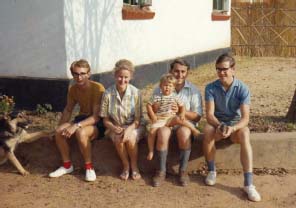
With the travellers: L to R Simon, self, Mark with Paul, Will
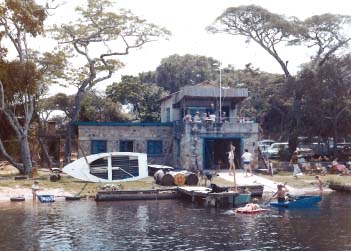
Happy days: Abercorn Yacht Club on a typical Sunday
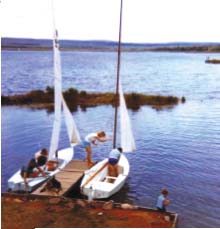
Rigging dinghies for a sail, Colin Carlin (R) supervising (Paul's minder Uelo out of shot!)
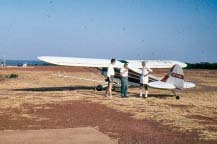
Will (L) with Carl Kuhne, Robin Crosse-Upcott and Cessna â International Red Locust Control Service
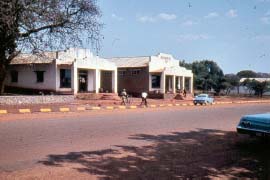
Westie's stores on Marshall Avenue, Abercorn's main street
